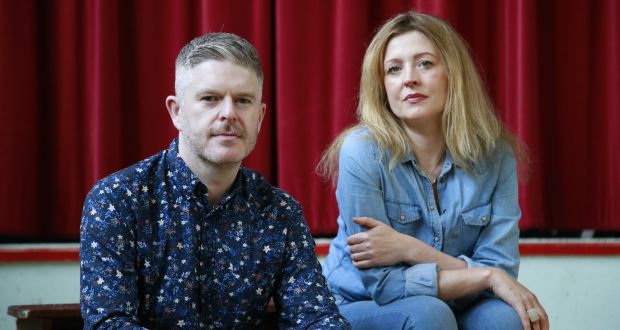Writer Phillip McMahon and director Rachel O’Riordan on making a play inspired by a hidden community of gay priests

By
Almost 20 years ago, the writer and director Phillip McMahon took a year out to travel, to discover and to party. For a young gay man of 20, it was a liberating, heedless and, by the sounds of it, curiously blessed time.
“I really wasn’t sure if I would tell this story,” he says, sitting under the shade of a tree with director Rachel O’Riordan, in the grounds of a Methodist church where his new play is being rehearsed. “But it’s a fascinating and important story.”
Such is the sensitivity of the story, he would prefer not to name the city where it took place, and where a friend of a friend owned a beautiful, unoccupied apartment on the waterfront. Would McMahon like to live in it, he was asked, rent free, for six months? He decided that he would. There was one stipulation, though. Every Monday, two middle-aged friends of the apartment’s owner would stay overnight, keeping to themselves in the spare bedroom. It seemed like a small price to pay.
In the end, though, the visitors treated McMahon like their guest. “I was 20,” he remembers. “I had just left Ireland. I was discovering all sorts of things. But mainly I was living my best life and wasting away from the epic party I was on.” To sustain him, each Monday the men shared a good meal and red wine with him at the table. Eventually McMahon asked what they did. “Oh, we’re Catholic priests,” they told him. They were also a committed couple. Monday nights were their nights together. McMahon was stunned.
“For a yet-to-start-recovering Catholic, that was very confronting,” he says. At the time, he was still a believer and they talked about the seemingly irreconcilable forces of faith and sexuality.
“They really felt that they could change the Catholic Church from the inside,” he says. “That their belief was so strong. They also said the education was not to be underestimated and the job itself was fabulous. And they were part of a much wider circle, a community of gay priests.”
Far-flung community
Over the years, McMahon discovered just how wide and far-flung that community is: the drag act Fanny and Pearl, whom he once directed, got their names while training to become priests. “Everyone had girls’ names in the seminary,” they told him.
When stories about gay priests emerge in the media, they tend to erupt with voltage of either religious hypocrisy, farcical comedy or quiet tragedy. Take the Vatican male prostitution scandal of 2010, or the Grindr scandal at St Patrick’s College, Maynooth in 2016. (“I hadn’t heard that,” says McMahon of a more recent story, “and I’ve got ‘Gay Seminarians’ on my Google alerts.”)
They told me I was special, and I believed them. I was swept up in it
In interviews, McMahon learned that the truth was usually less salacious. “They came to my small town, where I thought there was no way out,” he was told of religious recruitments. “There was a Marian parade through town, and it was the only glamour I’ve ever seen here. They told me I was special, and I believed them. I was swept up in it.”
At seminaries, no less than any given college, people quietly discovered their sexuality in private, often with each other. “Then, when it became too much – and what was too much could be decided on a whim – they were often asked to leave.”
Trove of stories
Here, McMahon considered, was a trove of stories about faith, repression, identity and sexuality – in short, about Ireland. “So, I was like, do I write the drama first, or the musical first?”
If you know McMahon’s work, as a playwright, director and one half of the uproarious Thisispopbaby, this is not an unimportant question.
His most recent works, such as Tara Flynn’s affecting Not a Funny Word, Thisispopbaby’s world-conquering cabaret Riot, the delicate lament of Town is Dead, and the stage production of Emmet Kirwan’s Dublin Oldschool all addressed matter with music.
“When we did Alice in Funderland,” he says, of the 2012 Abbey Theatre musical, its first in more than 20 years, “the reason music was so important was to allow Irish people to sing out, it felt, for the first time in a long time”.
When he came to write Come On Home, though, inspired by the secret world behind holy orders, the form couldn’t have been more traditional. It is a two-act play, set in the family home of three grieving brothers in rural Ireland, reunited for the funeral of their mother. Here, bitter arguments, long-held shames and painful secrets flare over Aristotelian unities of time and space, against the sturdy details of stage realism. “It came out as a living room drama,” McMahon nods. “I was as surprised as anybody.”
The idea that something was being outed interested me
When Rachel O’Riordan first read the play, in Wales where she now leads the acclaimed Sherman Theatre, she did so in a single sitting and agreed to direct it the next morning. “I like making work that has bite,” she tells me. “Which looks at the tough corners of our social interactions, things spoken and unspoken. The idea that something was being outed interested me.”
Both collaborators can relate personally to other concerns of the play: exile, homecoming and the death of a parent. McMahon’s protagonist is Michael, a one-time seminarian who lived most of his adulthood in London, leaving behind a punishing father, a resentful brother, a besotted woman who married his feckless younger brother, and, poignantly, his former lover, Aidan, who remained in the priesthood.
Complexity
The complexity of home has long occupied McMahon, who was born in London to Irish parents and moved back when he was 10. O’Riordan’s upbringing was even more peripatetic: born in Cork and educated in England, she established herself professionally in Belfast, with the celebrated new writing company Ransom, before leaving to run the Perth Theatre in Scotland and now the Sherman in Wales. Remarkably, Come on Home counts as her Abbey theatre debut.
“We talked about how Irish we feel or not,” O’Riordan says, “and how difficult that can be sometimes.” She admits to “a strange sense of loss even when I’m here. Because the Republic isn’t where I’ve made my career. I think there’s an instinct in Irish people to go away.”
Coming back carries its own tensions. McMahon recalls of his childhood, “There was this sense that we were too Irish for England and not Irish enough for Ireland. There’s a sense of never being at home. Then, of course, when you discover in your early teens that you’re a queer, you’re suddenly not at home again. You watch how easily other boys walk through life, and wonder, how are you doing that?”
Inherited commission
Come On Home was commissioned some years ago, under director Fiach MacConghail, and comes to the stage under his successors, Graham McLaren and Neil Murray. That makes it a rare inherited commission, but also a play emerging into an Ireland that no one could have imagined 20, 10 even five years ago; one in which the church has vastly diminished influence, and progressive sexual and gender rights have been enshrined by landslide public vote.
The characters in Come On Home seem to straddle the fault line of such a tectonic shift, caught between staying and going, in a new nation where many struggle to catch up. “I look around and I see the kids,” says the young priest, Aidan. “The boys – holding hands. And it tortures me. The freedom.”
Madness of grief
If this is a time of celebration, it is still riven with grief, in which long-buried traumas await their reckoning. “We talked a lot about how grief makes you feel,” says O’Riordan. “Bereavement and the madness that descends, and the damage to the whole family. That heartbreak,” says O’Riordan.
“But there’s also licence to say so much in that space,” adds McMahon. “Emotions are high. Drink is taken. In reality, a lot of shit goes down.” That recalls similar situations in the plays of Tom Murphy, riven with grief, exile, mourning and alcohol, and O’Riordan isn’t slow to claim a dramatic kinship. “But it’s also ‘queered’,” says McMahon, “and I hope that there’s something of today, or of my Ireland in there.”
That’s especially true of a family, however fractious, automatically performing funeral rituals together, where authority figures are tellingly absent. At one point, for instance, someone downloads the rosary.
Religion and spirituality can be quite separate. But when you reject one, you often reject the other
“I’ve been thinking about this a lot,” McMahon tells me. “Religion and spirituality can be quite separate. But when you reject one, you often reject the other. That leaves you a little bit at sea about how we can plug into a communal spirituality. I feel the absence of that: a connection.”
Some people find that connection in other ways, whether blissed out on a dancefloor or moved in a theatre, or in the overwhelming results of historic referendums. McMahon may worry still about making drama from private stories. “You can’t treat gay priests as a joke. When you shine a light in these corners, you have to do so sensitively.” But the play is neither an exposé, nor a confession. In bringing people together, whatever the circumstances, it comes closer to a communion.
Complete Article ↪HERE↩!
